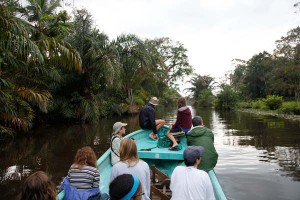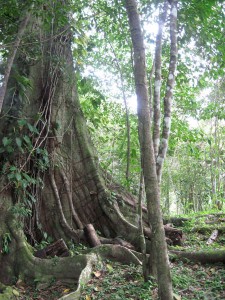We got on two boats in Boca del Drago for about an hour ride to Almirante n the mainland. In our bus ride from the Atlantic port of Almirante we went up the continental divide (about 3,000 feet at the roads highest point) and then down to the Pacific coastal city of David. The whole Atlantic to Pacific trip took us less than three hours! When then went back into the mountains into the region of Cerro Punta. On our journey today we went form hot humid, to cool, to hot and dry to cooler moist. We are saying goodbye to mosquitoes, and the heat, as well as to the ocean, coral reefs and the rainforest. We are excited about our next phase of the course. The cloud forest is an incredible place, while it may cool and wet, it is incredibly green and the forest has a unique character. It provides a good contrast to the lowland rainforest. Comparing the two locales can be helpful in understanding the forces that structure tropical ecosystems. For our first 3 nights in Cerro Punta we will stay in cabins owned by Los Quetzales Hotel. The cabins are quite far form the hotel itself. It takes about 25 minutes by 4 wheel drive vehicle over some very rough road to get to them. For the last night we will stay in the hotel itself. It will allow for a much quicker getaway on the morning of the 25th. The next time that I know that we can make a blog entry is on the 24th. While cell phone coverage is spotty in the areas of the cabins you most likely will be able to reach us if you need to.
Call 6936 4073 and Steve will answer
Call 6929 3353 and Amber will answer
Call 6936 4073 fro Steve
See Will’s blog entry below:
“From the bus to Los Quetzales in Cerro Punta:
We’re all on a comfortable and typically “speedy” Panamanian private bus heading up to the highlands. An early wake-up call got everybody on a boat to the small banana port of Almirante (with a quick stop at a restaurant for some superb fried dough). From there, we started off to Los Quetzales. The group is in good spirits, and I think everybody is happy with their group research projects from ITEC. Our papers will be posted when we’re back if not sooner, but here’s a teaser:
-Comparative biodiversity on the fore-reef and rear-reefs of Bocas del Toro
-The distribution and ecological role of Mangrove Oysters in brackish creeks
-Examining tank communities in Heliconias, including copepod distribution and flower cycle
-Studying Dendrobates poison-dart Frog territory sizes and breeding habits with mark-recapture methods
So, you can tell we’ve been working on a nice variety of studies. Not all of them had significant conclusions, but are part of important ongoing research at ITEC. It wasn’t all hard work though, and we also had plenty of time to strike out in smaller groups to explore or relax. I especially enjoyed some volleyball matches on the beach, smoothies in the nearby “town”, and getting to know our cooks for the week, Sylvia and Jeanetta. The wildlife was also wonderful, and we would regularly cluster up on a trail to quietly observe anything from howler monkeys and sloths to toucans and treefrogs. In addition to the group projects students engaged in individual art and/or science, for example:
-Using natural rainforest pigments and clay to make pre-Columbian-style art (Tom even improvised a kiln!)
-Wildlife-related art, photography, and research
-Heliconia dissection
-Mapping reef ecology webs
-Starfish movements
-Studying the station gecko populations (most of the marked geckos were recaptured from our rooms, but everybody still slept well- healthy gecko populations means fewer mosquitoes)
The individual initiatives will continue during our stay at Los Quetzales, but the group research projects will be replaced by a series of scheduled activities, nature hikes, and the like. We will not have electricity for a little while after this is posted in the main hotel, so it may be a while before we update our folks back home on how things go in the highlands- but everything from accommodations to research opportunities looks promising. Now, we’re moving slowly up the altitudinal gradient towards the cloud forest, dated American disco hits blaring from the radio, and enjoying the cooler breeze from the bus windows. It certainly is wonderful for me to get back in the neotropics, and the rest of the group is equally (if not more) happy to be here.
Till next blog,
William Freedberg”


